|
|
|
Sort Order |
|
|
|
Items / Page
|
|
|
|
|
|
|
| Srl | Item |
| 1 |
ID:
062104
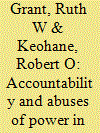

|
|
|
| 2 |
ID:
130956


|
|
|
|
|
| Publication |
2014.
|
| Summary/Abstract |
In July 2013 the UK's coalition government published "The Civil Service Reform Plan - One Year on", reporting on progress against minister Frances Maude's objectives to shake up the civil service. This followed various reported disagreements between ministers and civil servants over policy implementation, and a research report commissioned by the government from think tank IPPR into lessons from overseas for civil service reform. This trio of short articles reviews the government's proposals from three perspectives: that of the lead author of the IPPR report, a former senior civil servant, and the chair of the House of Commons Public Administration Committee (PASC) which oversees the civil service. The authors take differing views on the proposals, which include introduction of 'extended ministerial offices', and greater control by ministers over choosing their civil servants. Should these be seen as useful next steps, worrying developments, and/or large and important enough to merit a Commission on the civil service, as PASC has suggested?
|
|
|
|
|
|
|
|
|
|
|
|
|
|
|
|
| 3 |
ID:
173909
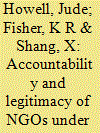

|
|
|
|
|
| Summary/Abstract |
How non-governmental organisations (NGOs) craft accountability and legitimacy in authoritarian states is poorly understood. We put forward a framework of analysis for capturing the processes of making accountability and legitimacy. We introduce the ideas of first- and second-order accountability and stocks of accountability capital. In authoritarian regimes, building second-order accountability through the accumulation of stocks of accountability is crucial for NGOs’ survival and organisational development and as a path towards gaining first-order accountability. Drawing on a decade of fieldwork on child welfare NGOs in China from 2007 to 2017, we select three case studies with long operational trajectories to illustrate processes of crafting legitimacy and accountability. The research contributes empirically and theoretically to the understanding of accountability in NGOs in authoritarian states through the novel analytic framework and case study of China.
|
|
|
|
|
|
|
|
|
|
|
|
|
|
|
|
| 4 |
ID:
144496
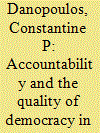

|
|
|
|
|
| Summary/Abstract |
This essay explores and assesses the connection between accountability and the quality of democracy in modern Greece along three key dimensions: vertical, horizontal, and social. Vertical involves elected officials and the three branches of government; horizontal deals with the nonelected arms of government and bureaucratic agencies; and social addresses civil society, the mass media, and nongovernmental organizations. Examination and analysis of the relevant data indicate that the state of accountability in Greece is weak in all three dimensions, and a host of structural, social, and attitudinal factors contributes to this weakness. Accountability problems undermine the quality of democracy. The essay expresses hope that reforms initiated under pressure from the European Union eventually would strengthen accountability and Greece’s quality of democracy.
|
|
|
|
|
|
|
|
|
|
|
|
|
|
|
|
| 5 |
ID:
149971
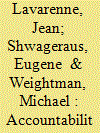

|
|
|
|
|
| Summary/Abstract |
The Fukushima-Daiichi Accident demonstrated the need of assessing and strengthening institutions involved in nuclear safety, including the accountability of regulators. There are a few problems hindering the path towards a greater understanding of accountability systems, the ensemble of mechanisms holding to account the nuclear regulator on behalf of the public. There is no consensus on what it should deliver and no systematic assessment method exists.
|
|
|
|
|
|
|
|
|
|
|
|
|
|
|
|
| 6 |
ID:
192960
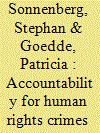

|
|
|
|
|
| Summary/Abstract |
This article explores how claims alleging serious human rights violations or breaches of international criminal law that occurred in the Democratic People's Republic of Korea (DPRK or North Korea) might unfold in the courts of the Republic of Korea (ROK or South Korea) under various differing jurisdictional theories. South Korea has legislation allowing for the exercise of universal jurisdiction, an increasingly widespread judicial mechanism for a national court to hold alleged perpetrators of serious human rights and humanitarian law violations accountable for their actions regardless of where the crime was committed and regardless of the victim's or the perpetrator's nationality. In South Korea, domestic criminal and civil jurisdiction can conceivably be "stretched" to encompass crimes perpetrated on the northern half of the Korean peninsula due to a constitutional provision that denies the existence of a separate North Korean sovereign nation. This article introduces and compares the feasibility and challenges of various jurisdictional approaches in South Korea that could address human rights crimes in North Korea, specifically (a) universal jurisdiction prosecution based on domestic law, (b) domestic criminal prosecution, and (c) civil cases in tort.
|
|
|
|
|
|
|
|
|
|
|
|
|
|
|
|
| 7 |
ID:
096932


|
|
|
| 8 |
ID:
142599
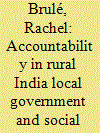

|
|
|
|
|
| Summary/Abstract |
This article studies variation in individuals’ perceived ability across India to hold local officials accountable for their performance. It finds significant gender differences in accountability perceptions, consistent with traditional social institutions. Exposure to progressive institutions of education and labor mobility is associated with the elimination and reversal of gender differences.
|
|
|
|
|
|
|
|
|
|
|
|
|
|
|
|
| 9 |
ID:
096572


|
|
|
|
|
| Publication |
2010.
|
| Summary/Abstract |
Foreign aid involves a chain of accountability relationships stretching from international donors through national governments and implementing agencies to a set of ultimate end users of the goods and services financed by the aid. In this paper, I review five different accountability relationships that exist in foreign aid projects among donors, governments, implementing agencies and end users. Then I summarize existing empirical evidence demonstrating that foreign aid functions better-both at the macro-level of aid flows and at the micro-level of individual aid projects-when there is more government and implementing agency accountability. Specifying several mechanisms that facilitate accountability, I emphasize that participation is a tool often used to produce accountability within aid projects. However, in terms of donor accountability to aid-receiving countries and the end users in them, recent pushes for increased participation have not resulted in more accountability in the design of aid programs. Ultimately, although enthusiasm for participatory models of aid design and delivery is warranted, participation is not a panacea for all the accountability problems in foreign aid programs.
|
|
|
|
|
|
|
|
|
|
|
|
|
|
|
|
| 10 |
ID:
149069
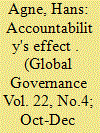

|
|
|
| 11 |
ID:
140334
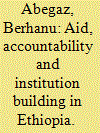

|
|
|
|
|
| Summary/Abstract |
Forty billion dollars of ODA over the past two decades has reduced destitution in post-socialist and post-conflict Ethiopia. It has also boosted the technocratic capacity of exclusionary state institutions, while doubly enfeebling the fledgling private sector and independent political and civic organisations. This aid–institution paradox is a product of an alignment of donor–recipient strategic interests. The five major donors pursued geopolitical and poverty reduction objectives; and the narrowly based ruling elite sought total capture of the state, ownership of the development agenda and use of pro-poor growth to leverage large aid inflows and to seek domestic political legitimacy. By coupling poverty reduction with adequate space for inclusive market, civic and political engagement, a farsighted coalition of donors could have complemented capacity building with the promotion of state resilience. Scaled-up aid can still be delivered, as in Eastern Europe, conditional on meaningful mutual accountability and the rule of law.
|
|
|
|
|
|
|
|
|
|
|
|
|
|
|
|
| 12 |
ID:
133430


|
|
|
|
|
| Publication |
2014.
|
| Summary/Abstract |
This paper analyses anti-corruption efforts in post-conflict Liberia. It highlights citizens' views on the definition of corruption and argues that, in the past, anti-corruption efforts have often focused on institution building and formal justice mechanisms without sufficient understanding of accountability dynamics on the ground. Anti-corruption approaches in Liberia have only nominally examined whether there is a shared understanding of what 'corruption' is and why it is regarded as a problem. The paper examines the social norms and perceptions that underlie understandings of the term corruption. It argues that the international community may have overlooked the fact that 'corruption' has become an all-encompassing term that masks a myriad of differing priorities and concerns. The authors posit that 'accountability' may be a more useful lens for those actors hoping to improve governance in these contexts.
|
|
|
|
|
|
|
|
|
|
|
|
|
|
|
|
| 13 |
ID:
134293
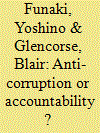

|
|
|
|
|
| Summary/Abstract |
This paper analyses anti-corruption efforts in post-conflict Liberia. It highlights citizens’ views on the definition of corruption and argues that, in the past, anti-corruption efforts have often focused on institution building and formal justice mechanisms without sufficient understanding of accountability dynamics on the ground. Anti-corruption approaches in Liberia have only nominally examined whether there is a shared understanding of what ‘corruption’ is and why it is regarded as a problem. The paper examines the social norms and perceptions that underlie understandings of the term corruption. It argues that the international community may have overlooked the fact that ‘corruption’ has become an all-encompassing term that masks a myriad of differing priorities and concerns. The authors posit that ‘accountability’ may be a more useful lens for those actors hoping to improve governance in these contexts.
|
|
|
|
|
|
|
|
|
|
|
|
|
|
|
|
| 14 |
ID:
178532
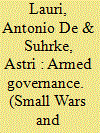

|
|
|
|
|
| Summary/Abstract |
This article examines the genealogy and behavior of the CIA militias in Afghanistan against the backdrop of persistent armed governance whereby a plurality of actors competes over control and rule. The nonaccountable use of force by militias and their volatile alliances increase the extent of armed governance, exacerbating issues of human rights abuses and undermining the possibility of future claims for justice. We discuss the effects of recurrent political violence on the peace talks and the implications for a sustainable peace, the need to include a solution for the role of militias in a peace agreement, and the necessity of ending impunity.
|
|
|
|
|
|
|
|
|
|
|
|
|
|
|
|
| 15 |
ID:
141816
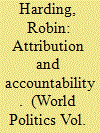

|
|
|
|
|
| Summary/Abstract |
Do voters in Africa use elections to hold governments accountable for their performance in office? In contexts of limited information and weak state capacity, it can be difficult for citizens to attribute the provision of public goods and services to political action. As a result, voters often have little information about government performance on which to condition their electoral support. Such contexts are frequently characterized by clientelism or ethnic politics, and there is a widespread impression that African elections are little more than contests in corruption or ethnic mobilization. Using an original panel data set containing electoral returns and detailed information on road conditions throughout Ghana, the author provides robust evidence that when a public good can be attributed to political action, as is the case with roads in Ghana, electoral support is affected by the provision of that good. The author also uses data on a variety of educational inputs to test the claim that votes are conditioned only on attributable outcomes.
|
|
|
|
|
|
|
|
|
|
|
|
|
|
|
|
| 16 |
ID:
089414


|
|
|
|
|
| Publication |
2009.
|
| Summary/Abstract |
Bangladesh's parliamentary elections in December 2008 witnessed a landslide victory for an alliance led by Sheikh Hasina's Awami League following two years of a caretaker government backed by the military. The country's beleaguered population faced the twin challenges of natural disasters and pervasive poverty. One of the key factors influencing trust in the government of Bangladesh is stability, which has been in short supply because of confrontational politics between the two largest parties and accompanying violence. This paper considers efforts to rebuild trust by examining the work of a social movement, Transparency International Bangladesh (TIB), at two levels: strengthening the pillars of the national integrity system (with a specific focus on parliament), and holding public bodies to account for corrupt practice in delivering key services. People's experiences of services delivered through schools, hospitals and local government have resulted in a complete collapse in trust in public bodies. The commitment of the democratically elected government to tackle corruption at all levels will be a key determinant of whether trust and stability can emerge from the volatility of Bangladesh's politics.
|
|
|
|
|
|
|
|
|
|
|
|
|
|
|
|
| 17 |
ID:
184729


|
|
|
|
|
| Summary/Abstract |
This study analyses the intricate relationship between sanction-based accountability and bureaucratic shirking. Drawing on an original survey conducted among Chinese civil servants, it addresses the question of whether sanction-based accountability can effectively regulate the conduct of public officials and provide a cure for bureaucratic shirking. The study identifies the characteristics of shirking behaviour in the Chinese bureaucracy and distinguishes three major patterns: evading responsibility, shifting responsibility and reframing responsibility. The findings indicate that sanction-based accountability may contain some obvious and notorious slacking types of behaviour, such as stalling and inaction, but government officials may distort or reframe their responsibilities to cope with accountability pressure. Empirical evidence suggests that owing to some “strategic” adjustments in bureaucratic behaviour, flagrant shirking is replaced by more subtle ways of blame avoidance, such as playing it safe or fabricating performance information. Sanction-based accountability therefore does not offer a panacea for bureaucratic shirking.
|
|
|
|
|
|
|
|
|
|
|
|
|
|
|
|
| 18 |
ID:
147852
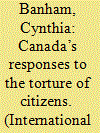

|
|
|
|
|
| Summary/Abstract |
Traditional analyses of Canada’s behaviour on international human rights tend to view it through the prism of the state’s global identity as a good international citizen. Such explanations are limited in helping us understand Canada’s inconsistent responses to allegations that two citizens were tortured in the war on terror—Maher Arar and Omar Khadr. This article uses Jutta Brunnée and Stephen Toope’s interactional account, which emphasizes the need for continuous shared practices of legality in order for international human rights norms to exert influence, to analyze Canada’s responses to the torture of citizens. It argues that to make sense of Canada’s behaviour, we need to examine the role of different state and non-state actors in terms of whether they were agitating for Canada’s compliance with the international prohibition against torture. Civil society was critical in shaping the responses of the Canadian state to the torture of citizens.
|
|
|
|
|
|
|
|
|
|
|
|
|
|
|
|
| 19 |
ID:
192180
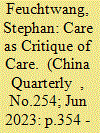

|
|
|
|
|
| Summary/Abstract |
Socialist governance and popular sovereignty require state administration of care. In the People's Republic of China (PRC) today, such state care is provided in the form of public services and in the guarantee of social security. Ideally, different levels of government should foster relations of care in local communities and remain responsive to “the people.” Local self-government, relations of mutual support and ritual communities, however, reveal the deficits of state care. Much like general philosophies of care, such local ethics of care propose universal benchmarks against which social practice can be measured. This article outlines the main contours of state care in the post-Mao Zedong PRC, and contrasts its findings with empirical research on public services, social security and ritual responsiveness. Mutual help, neighbourhood communities and ritual practice, in particular, provide alternative models of care. As such, they can be extended and universalized, and offer possibilities for a critique of care.
|
|
|
|
|
|
|
|
|
|
|
|
|
|
|
|
| 20 |
ID:
154471


|
|
|
|
|
| Summary/Abstract |
The past decade has seen a frontier open up in international development engagement with the entrance of new actors such as celebrity-led organisations. We explore how such organisations earn legitimacy with a focus on Madonna’s Raising Malawi and Ben Affleck’s Eastern Congo Initiative. The study draws from organisational materials, interviews, mainstream news coverage, and the texts of the celebrities themselves to investigate the construction of authenticity, credibility, and accountability. We find these organisations earn legitimacy and flourish rapidly amid supportive elite networks for funding, endorsements, and expertise. We argue that the ways in which celebrity-led organisations establish themselves as legitimate development actors illustrate broader dynamics of the machinery of development.
|
|
|
|
|
|
|
|
|
|
|
|
|
|
|
|
|
|
|
|
|